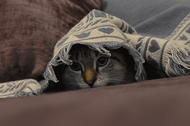Your Cat Is Stressed Out
You might not realize it, but some of your behaviors may be stressing out your cat. While most cat owners aren’t intending to make their cat feel anxious, some may be unaware of the effects their actions can have on their cat’s behavior and relationships.
Pet expert Mikkel Becker has identified five common ways you may be unknowingly stressing out your cat. So if you catch yourself or anyone in your home doing these things, your cat will thank you for stopping immediately.
1. Only bringing out the crate when it’s time to visit the vet
When cats are only crated in stressful situations, like visits to the vet or groomer, it can teach them to dislike the crate. Many will hide or put up a fight to avoid going inside. Teaching your cat to go willingly into the crate by making it a comfortable place to spend time in every day can make requiring her to go in the carrier a lot less stressful.
2. Using punishment to try and change behavior
Punishment isn’t the solution to stopping unwanted behavior. Your cat doesn’t understand that what she’s doing is wrong, and she doesn’t know what to do instead. Because of this, punishment may feel inconsistent and random to her, causing her to become anxious and wary.
3. Thinking that scaring your cat is harmless or funny
We’ve all seen the videos of cats terrified by cucumbers. Hilarious? Not to cats. A cat who is repeatedly startled can become neurotic and wary, and may become afraid of places she previously found safe. Scaring a cat where she eats or drinks is especially mean, as she may start to avoid these areas as well, leading to health problems.
4. Letting the dog chase the cat
Flat out scary. Your cat does not like this. Some pet owners often believe the cat is taunting the dog or that cats and dogs just act this way and there’s nothing that can be done, but the result will often be an anxious, stressed-out cat.
5. Assuming your cat is happy to sleep all day
Many cats lack the opportunity to exercise their hunting drive and owners assume that they have lost this drive. If left without a way to focus her hunting instincts, a cat may scratch furniture, stalk other household cats, or she may just sleep all day and not get enough exercise. One way to help solve this problem is to serve portions of her meal in food puzzles or place kibble in areas she frequents, like perches, to make your cat “hunt” for her food.
With any behavioral problem or major change in your pet’s behavior, it’s always important to check for any underlying medical conditions that could potentially be causing or worsening the problem. If you have any concerns about your cat’s behavior, talk with your vet right away.
_______________________________________________
To give your cat the exercise it needs, EasyPetFence.com suggests that pet owners install a cat fence in the yard for cats to 1) Socialize with other animals; 2) Remain active; 3) Get fresh air. See Kitty Corral Cat Fence Kits for more information.
Article re-posted from Life With Cats,
